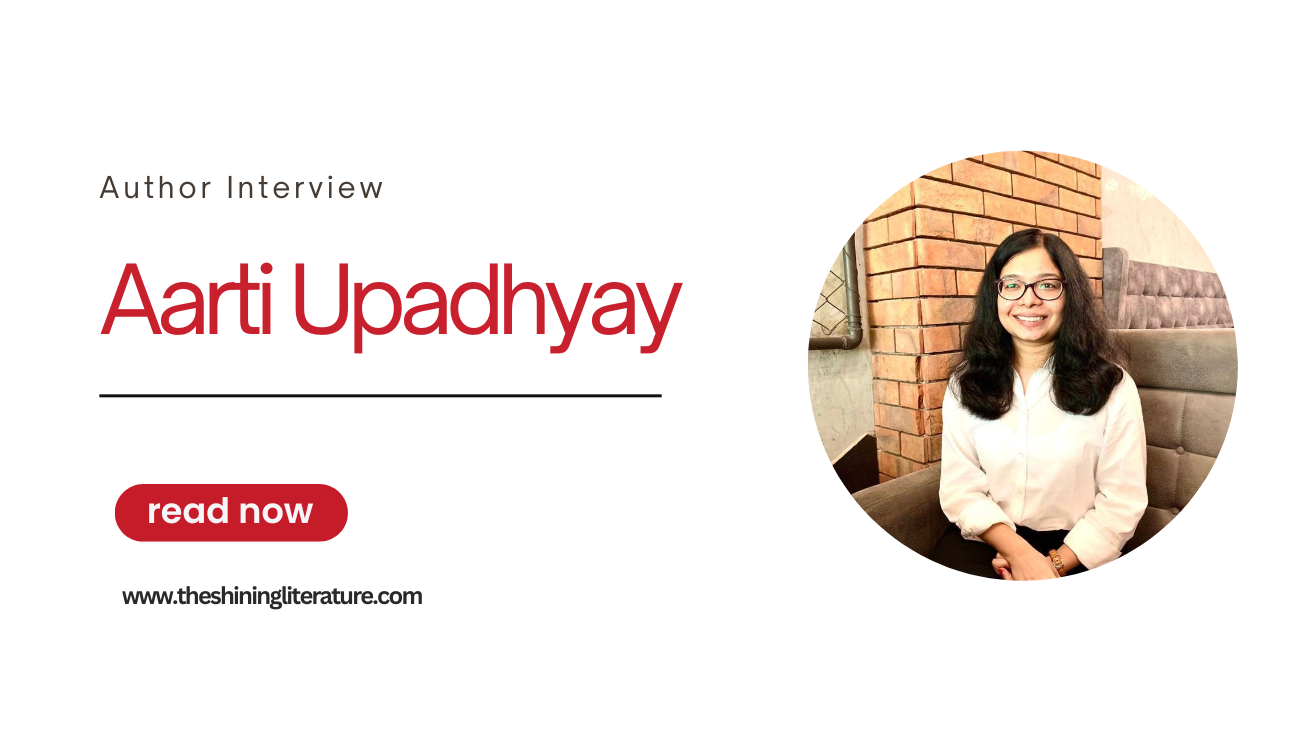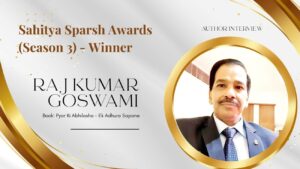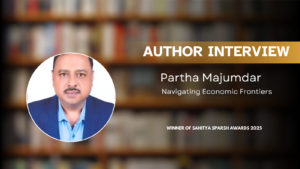Your book Remnants is deeply personal and introspective. What inspired you to turn your experiences of grief and healing into poetry?
Writing became my lifeline, a way to breathe through the grief when words failed me in speech. When my psychiatrist encouraged me to sit with my pain, poetry became the space where I could finally let it exist without judgment. Healing isn’t linear; some days the grief felt like a storm, other days just a whisper, but always present. Putting those emotions on paper wasn’t just venting out, it was an act of survival.
What surprised me was how universal these fragments of sorrow felt. If I could name my own ache, perhaps someone else might see their reflection in these lines and feel less alone. That hope—that my words might be a lantern for another traveller in the dark—is what turned these poems from personal remnants into something meant to be shared
Grief is often described as a solitary journey. How did writing these poems help you navigate your own healing process?
Grief is solitary, no one can walk it for you but writing these poems made the unbearable weight feel shared. Putting pain onto paper felt like lifting an elephant off my chest.
These words became my silent companions between therapy session, it was a way to untangle emotions too knotted to speak aloud. You’ll notice many poems read like conversations with myself: raw, unfiltered moments where I finally acknowledged the pain instead of running from it.
That act of naming the grief, of giving it shape on the page was the first step in learning how to carry it, rather than be crushed by it. If you notice – some poems, like ‘The Void,’ capture the isolation directly and others, like ‘When Joy Knocked,’ document the fragile moments when light began to seep back in. Together, they map the non-linear path of healing I couldn’t see while I was walking it.
The title Remnants: A Journey through Grief, Love and Becoming is powerful. How did you arrive at this title, and what does “becoming” mean to you personally?
The title Remnants came to me as I realized grief doesn’t erase love—it transforms it. These poems are the fragments I gathered from what was lost: not as ruins, but as sacred pieces to carry forward.
‘Becoming’ is the quiet revolution in that process. It’s the choice to let sorrow soften rather than harden you—to allow loss to sculpt you into someone wiser, more tender, more alive. This book is my testament that heartbreak doesn’t get to write the ending. The love that remains becomes part of who you’re becoming, like seeds in the cracks of a broken heart
You mention that your conversations with your psychiatrist, friends, and family shaped this collection. Could you tell us more about how these safe spaces influenced your writing?
Grief reshapes you in ways that are impossible to articulate—but my psychiatrist, friends, and family gave me the rare gift of being witnessed without judgment. They didn’t rush me to ‘get better’ or paper over the cracks with platitudes. Instead, they held space for the messiness of healing, allowing me to unfold at my own pace.
Their acceptance became the soil where these poems could take root. When I wrote A Cry for Help or When Grief Became My Body, it was their voices I heard in the silence afterward, saying: This too is part of the story. They taught me that brokenness isn’t the opposite of wholeness, it’s the raw material of becoming. Without those safe harbors, this book would have been a scream into the void. Because of them, it became a conversation.
Were there any poems in the book that were particularly difficult to write—or perhaps too emotional to revisit?
Some poems felt like pressing on a bruise—necessary, but tender. Writing about loss meant confronting not just what was gone, but the future that vanished with it. The imagined life, the unshared moments, the quiet ‘what ifs’—putting those into words was like mourning twice.
Poems like December 2020 and The Void were especially difficult; they forced me to sit with grief’s sharpest edges. But there was a strange alchemy in giving those feelings a shape on the page. By the last line, the pain no longer lived solely in my body—it had somewhere else to exist. That’s when the peace would come: not because the hurt disappeared, but because I’d finally made room for it to breathe.
How do you balance vulnerability and craft in your poetry? Do you ever feel exposed by your words, or is it a form of empowerment for you?
Writing is an act of undressing the soul. Yes, it leaves you exposed—but that exposure is where the alchemy happens. The privilege (and curse) of being a writer is that we don’t get to hide behind prettier versions of the truth.
Vulnerability isn’t opposed to craft; it’s craft’s beating heart. A poem like Broken Mirror or The Weight of Chance would ring hollow without the cracks showing. That moment when you write something and think ‘This reveals too much’? That’s usually when you’ve struck gold.
Is it terrifying? Absolutely. But there’s power in saying: This is my truth. Take it or leave it. Every time I share what scares me, I reclaim a little more of myself.
In a world that often encourages us to “move on” quickly, your book allows space for sitting with pain. What message would you like readers, especially those grieving, to take away from your work?
Grief is not something to ‘get over’, it’s something to move through. There are no shortcuts, no detours. The only way out is in.
This book is an invitation to sit with your pain, to honor it as the natural companion to love. Grief isn’t love’s leftover; it’s its echo, just as deep and just as real. You cannot rush healing by pretending the hurt doesn’t exist. The irony? The moment you stop running, the moment you turn inward and truly listen is when the weight begins to shift.
To anyone grieving: Your sorrow is not a flaw. It is proof of your capacity to love. And though it may not feel like it now, this pain will one day weave itself into your life in ways that make you stronger, softer, more alive. Healing isn’t about forgetting—it’s about learning how to carry what remains with grace. There is hope, even when you can’t yet see it
Many readers find solace in your words. Have you received any responses from readers that touched you deeply or surprised you?
One message that will stay with me forever came from a reader who said, ‘Your words gave mine a home when I had none.’ She shared how Remnants helped her feel less alone in her grief—that seeing her pain reflected in my poems made it somehow more bearable.
But the most humbling part? When she wrote, ‘You’re showing us what healing with grace looks like.’ Me? An example? That took my breath away. Because some days, I still feel like the girl in A Cry for Help but her message reminded me that even our fractures can become compasses. That’s the unexpected gift of this book: my wounds became a map others could trace with their fingers, saying, I know this terrain too. And suddenly, the loneliness of grief had cracks where the light could meet us both
Poetry as a genre is intimate yet universal. Who are some poets or authors who have influenced your voice and style?
I’m drawn to writers who tell the truth boldly and clearly. Joan Didion stands out for me—especially in The Year of Magical Thinking, where she explores grief with such honesty and precision. She taught me that the hardest truths often come quietly, not loudly. Ocean Vuong’s writing moves me in a similar way—his mix of raw emotion and poetic beauty is unforgettable.
My love for words goes back further. Shakespeare’s deep understanding of human emotion still feels real today. The Romantic poets showed me how to find beauty in everyday things. I carry Mary Oliver’s gentle wisdom, Sylvia Plath’s intensity, Edgar Allan Poe’s dark elegance, and Rilke’s spiritual insight with me. They all remind me that poetry can transform pain into strength, silence into expression—and that every honest word about loss is a way to push back against despair.
What’s next for you as a writer? Are there more themes or experiences you hope to explore in future work?
For now, I’m immersed in the archaeology of emotions—reading, researching, letting the quiet work of observation settle into my bones. The next project will reveal itself when it’s ready.
It might be another collection of poems; grief taught me how much can be contained in the white space between words. Or perhaps a novel, where I could stretch these emotional truths across a broader canvas. Joan Didion once wrote, ‘I write entirely to find out what I’m thinking’—that compass still guides me. Whatever form emerges, I know it will demand the same unflinching honesty that Remnants required.
Right now, I’m listening more than writing. And that’s exactly where I need to be.
Visit: https://aartiupadhyay.in

Aarti Upadhyay is a seasoned marketing and communications professional with over 14 years of experience spanning advertising, IT, and government consulting. A postgraduate from St. Xavier’s College, Ahmedabad, she also holds a PG Certification in Advertising & PR (Online) from MICA. Throughout her career, Aarti has skillfully blended strategy with storytelling, helping brands find their authentic voice.
Her debut book, Remnants: A Collection of Grief and Hope, is a heartfelt exploration of love, loss, and resilience — themes that reflect her deep engagement with human emotion and inner worlds. Aarti is an avid reader who lives and thrives on stories, both real and imagined. As someone who has spent her professional life shaping narratives, this collection marks a personal milestone in expressing her own.
Fascinated by human psychology, she often spends her free time studying emotions and observing the quiet, complex ways people connect and cope. She also firmly believes that dogs were created to show humans the purest form of love — selfless, warm, and unwavering.




